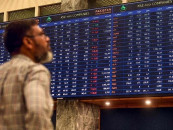Gold rises despite global decline
Jumps Rs1,500/tola; exchange firm exits market amid tightening regulations

Gold prices in Pakistan rose on Tuesday, defying the trend in the international market where bullion slipped due to renewed optimism about a possible trade agreement between the United States and its trading partners. A stronger US dollar and rising Treasury yields further weighed on global gold prices.
In the local market, the price of gold per tola increased Rs1,500 to reach Rs354,500, according to data released by the All Pakistan Sarafa Gems and Jewellers Association (APSGJA). Meanwhile, the price of 10 grams of gold rose Rs1,286, closing at Rs303,926.
This upward movement in domestic gold prices comes a day after the local market saw a drop of Rs2,500 on Monday, when gold settled at Rs353,000 per tola.
Commenting on the international outlook, Interactive Commodities Director Adnan Agar noted that gold was trading around $3,294 per ounce, having touched the low of $3,280-85 and the high of $3,340 during the session.
"As I mentioned earlier, the market appears to be gradually declining. There is strong support at $3,270 and $3,250. If prices drop to these levels, we could see a rebound. However, a break below this range could push the market down towards $3,200," he said.
International spot gold eased 0.4% to $3,322.93 per ounce, as of 1325 GMT. US gold futures fell 0.3% to $3,332.30, according to Reuters.
The benchmark 10-year Treasury yield hit a more than two-week high, making non-yielding gold less attractive, while the US dollar edged 0.2% higher.
Meanwhile, the Pakistani rupee continued its downward trend against the US dollar, slipping 0.05% in the inter-bank market on Tuesday. By the end of trading, the rupee stood at 284.36, marking a drop of 14 paisa from Monday's close at 284.22.
Moreover, Money Link Exchange Company closed its operations and surrendered its licence to the State Bank of Pakistan (SBP), which has officially revoked the company's authorisation to carry out any kind of foreign exchange business. The move highlights concerns among foreign exchange companies over what industry stakeholders describe as excessive regulations and a shrinking scope of operations.
Exchange Companies Association of Pakistan (ECAP) General Secretary Zafar Paracha expressed disappointment over the closure, stating that overregulation and limited business avenues have pushed even well-established companies out of the market. "It is unfortunate that a big group like Money Link is exiting. The environment is no longer viable for us," he said.
Another exchange company official, speaking anonymously, said that the formal exchange business was losing ground to the grey market as a result of overly strict regulations and limited flexibility. "We have only two avenues left – selling currency to retail customers and handling remittances. Meanwhile, banks have been given preferential treatment to operate in this space, while exchange companies face harsh compliance demands," he added.
Key regulatory conditions, such as mandatory biometric verification for transactions as low as $100, the requirement of travel documents for outward remittances of over $950 and the restriction that transfers above $1,950 can only be made through bank accounts, have been cited as major obstacles.
Stakeholders argue that this level of scrutiny hampers genuine customer transactions and deters individuals from using formal channels. "We operate by buying and selling dollars between individuals, but excessive interference has made the business unsustainable. This could lead to monopolies and the collapse of healthy competition," warned a senior industry member.





















COMMENTS
Comments are moderated and generally will be posted if they are on-topic and not abusive.
For more information, please see our Comments FAQ